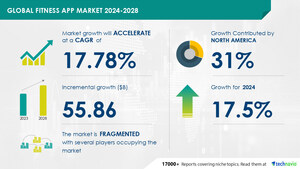NEW YORK, Oct. 28, 2024 /PRNewswire/ -- Report on how AI is driving market transformation- The global modular and portable building market size is estimated to grow by USD 42.3 billion from 2024-2028, according to Technavio. The market is estimated to grow at a CAGR of 6.3% during the forecast period. Rising demand for versatile infrastructure solutions is driving market growth, with a trend towards sustainability benefits associated with modular and portable constructions. However, lack of skilled labor poses a challenge. Key market players include Abtech Inc., Ahura Gas Enterprise Pvt Ltd, Allied Modular Building Systems, Inc., Cotaplan, CRATE Modular Inc., Cube Modular Ltd, EPACK Polymers Pvt Ltd., Excel Modular, Henan K-Home Steel Structure Co.,Ltd., Loom Crafts Shade Systems Pvt Ltd, Masterkabin Ltd, McGrath RentCorp, Inc, Morgan USA, Panel Built, Inc., Parkut International Inc, Portable Facilities Ltd, PortaFab Corp., Portakabin Ltd., Pressmach Infrastructure Pvt Ltd., Thurston Group Ltd., United Partition Systems, Inc., and WILLSCOT MOBILE MINI HOLDINGS CORP..
AI-Powered Market Evolution Insights. Our comprehensive market report ready with the latest trends, growth opportunities, and strategic analysis- View your snapshot now
Forecast period |
2024-2028 |
Base Year |
2023 |
Historic Data |
2018 - 2022 |
Segment Covered |
Type (Modular buildings and Portable buildings), Material (Steel, Wood, Concrete, and Composite materials), and Geography (APAC, North America, Europe, South America, and Middle East and Africa) |
Region Covered |
APAC, North America, Europe, South America, and Middle East and Africa |
Key companies profiled |
Abtech Inc., Ahura Gas Enterprise Pvt Ltd, Allied Modular Building Systems, Inc., Cotaplan, CRATE Modular Inc., Cube Modular Ltd, EPACK Polymers Pvt Ltd., Excel Modular, Henan K-Home Steel Structure Co.,Ltd., Loom Crafts Shade Systems Pvt Ltd, Masterkabin Ltd, McGrath RentCorp, Inc, Morgan USA, Panel Built, Inc., Parkut International Inc, Portable Facilities Ltd, PortaFab Corp., Portakabin Ltd., Pressmach Infrastructure Pvt Ltd., Thurston Group Ltd., United Partition Systems, Inc., and WILLSCOT MOBILE MINI HOLDINGS CORP. |
Key Market Trends Fueling Growth
Modular and portable construction is an economical and time-efficient alternative to traditional building methods, offering substantial sustainability benefits. Approximately 90% of modular building construction takes place off-site in a controlled factory environment, reducing environmental disruption and ensuring efficient use of materials and energy. Recycled materials, such as recycled steel, wood, and glass, are increasingly being used in modular buildings, contributing to a circular economy. Additionally, modular buildings are inherently recyclable and can be easily dismantled and relocated, avoiding the need for demolition and its associated environmental impact. These sustainability advantages make modular construction an attractive option for developers and builders seeking eco-friendly solutions, driving the growth of the global modular and portable building market.
The Modular and Portable Building market is experiencing significant growth, particularly in commercial applications such as healthcare and hospitality sectors. Customization is a key trend, with businesses seeking ecofriendly, energy-efficient building solutions for cost-effective construction. Structural stability and quicker construction times are major advantages, allowing for flexibility in various industries. Rapid urbanization drives demand for sustainable solutions like prefabricated and volumetric construction. Prefabricated structures are increasingly popular for temporary and semi-permanent usage in commercial real estate. Walls, roofs, floors, columns, and beams are prefabricated off-site, reducing waste and enhancing tenant comfort. Eco-friendly materials and energy-efficient systems, including plumbing, heating, ventilation, and lighting, are essential. Specialty buildings like guardhouses and portable cabins are also in demand for temporary workspaces and storage areas. Foreign direct investment in this sector continues to grow, fueling innovation and expansion.
Insights on how AI is driving innovation, efficiency, and market growth- Request Sample!
Market Challenges
- The modular and portable building market is experiencing significant growth due to the efficiency and cost benefits of off-site construction. However, a shortage of skilled labor specialized in modular assembly and installation can hinder project execution. In India, for instance, 90% of construction workers lack core skills, impeding the adoption of modular buildings. This skill gap can lead to delays, increased costs, and compromised quality. To address this issue, targeted training programs and educational initiatives are necessary to build a competent workforce and ensure the continued growth of the global modular and portable building market.
- The Modular and Portable Building Market encompasses various applications such as Ticket Booths, Mobile Medical Clinics, and Portable Toilets. This industry faces challenges in sectors like Education and Healthcare, requiring Modular Building Technologies for durability and affordability. Sustainability is key, with a focus on Smart Technologies, Internet Access, and Remote Monitoring. Energy Efficiency and Eco-Friendly Materials like Bamboo, Straw Bale Panels, and Recycled Materials are essential. Challenges include Temperature Management, Insulation, and Air Quality. Construction materials include Concrete, Steel, and Wood, with advancements in Single Layer and Double Layer Structures, Thermal Insulation, and Acoustic Insulation. Offsite building, including Prefabricated Volumetric building modules, is a growing trend in Nonresidential construction and Sustainable construction. Project preplanning, Permanent Modular Construction, and Relocatable Modular Construction are crucial for cost-effective and efficient solutions. Solar Panels and LED Lighting are important for energy sustainability.
Insights into how AI is reshaping industries and driving growth- Download a Sample Report
Segment Overview
This modular and portable building market report extensively covers market segmentation by
- Type
- 1.1 Modular buildings
- 1.2 Portable buildings
- Material
- 2.1 Steel
- 2.2 Wood
- 2.3 Concrete
- 2.4 Composite materials
- Geography
- 3.1 APAC
- 3.2 North America
- 3.3 Europe
- 3.4 South America
- 3.5 Middle East and Africa
1.1 Modular buildings- Modular construction, also known as prefabricated or off-site building, offers substantial cost savings and efficiency advantages. By manufacturing building components in a factory setting and assembling them on-site, this method reduces material and labor costs by approximately 20% and 30% respectively. Sustainability is another key benefit, as modular construction minimizes waste and supports greener building practices, contributing to a reduction in CO2 emissions. However, regulatory hurdles, market acceptance, and the need for skilled labor pose challenges to broader adoption. Despite these obstacles, the demonstrated benefits make a compelling case for overcoming these barriers. Modular buildings, a transformative segment within the modular and portable building industry, offer cost-effective, efficient, and sustainable construction solutions. As more regions implement supportive regulations, the adoption of modular construction is expected to increase, driving growth and innovation in the industry. Therefore, the modular buildings segment is poised for significant growth in the global modular and portable building market.
Download complimentary Sample Report to gain insights into AI's impact on market dynamics, emerging trends, and future opportunities- including forecast (2024-2028) and historic data (2018 - 2022)
Research Analysis
The Modular and Portable Building Market encompasses prefabricated structures designed for both temporary and semi-permanent usage. These buildings are constructed off-site through off-site manufacturing and offsite building techniques, resulting in quicker construction and reduced waste. Volumetric building modules are a popular choice, offering flexibility for various applications, including portable cabins, temporary workspaces, and storage areas. Tenant comfort is prioritized through advanced insulation, heating, and cooling systems. Air quality is ensured through proper ventilation and filtration systems. Sustainable construction practices, such as green infrastructure and PPVC, are increasingly incorporated, making these buildings eco-friendly and cost-effective solutions for nonresidential construction projects. Structural stability is maintained through rigorous testing and engineering, ensuring durability and safety. Overall, the modular and portable building market offers sustainable, flexible, and efficient solutions for commercial real estate and various industries.
Market Research Overview
The Modular and Portable Building Market encompasses a range of prefabricated structures designed for temporary and semi-permanent usage. These buildings are constructed off-site using modular building technologies, resulting in faster construction times, reduced waste, and increased flexibility. The market includes various types of structures such as prefabricated shelters, portable cabins, temporary workspaces, and storage areas. Tenant comfort is prioritized with the integration of plumbing, heating, ventilation, and lighting systems. Specialty buildings include guardhouses, ticket booths, mobile medical clinics, and portable toilets. The market caters to various sectors like education and healthcare, with a focus on durability, sustainability, and eco-friendly materials such as bamboo, straw bale panels, shipping containers, and solar panels. Insulation, acoustic insulation, and thermal insulation are essential components to ensure air quality and temperature management. The market also offers energy-efficient and cost-effective solutions using volumetric building modules, smart technologies, and internet access for remote monitoring and temperature management. The market is driven by rapid urbanization, sustainable construction, and the need for quicker construction methods. Concrete, steel, and wood are commonly used materials, with commercial applications in healthcare, hospitality, and customization of ecofriendly products.
Table of Contents:
1 Executive Summary
2 Market Landscape
3 Market Sizing
4 Historic Market Size
5 Five Forces Analysis
6 Market Segmentation
- Type
- Modular Buildings
- Portable Buildings
- Material
- Steel
- Wood
- Concrete
- Composite Materials
- Geography
- APAC
- North America
- Europe
- South America
- Middle East And Africa
7 Customer Landscape
8 Geographic Landscape
9 Drivers, Challenges, and Trends
10 Company Landscape
11 Company Analysis
12 Appendix
About Technavio
Technavio is a leading global technology research and advisory company. Their research and analysis focuses on emerging market trends and provides actionable insights to help businesses identify market opportunities and develop effective strategies to optimize their market positions.
With over 500 specialized analysts, Technavio's report library consists of more than 17,000 reports and counting, covering 800 technologies, spanning across 50 countries. Their client base consists of enterprises of all sizes, including more than 100 Fortune 500 companies. This growing client base relies on Technavio's comprehensive coverage, extensive research, and actionable market insights to identify opportunities in existing and potential markets and assess their competitive positions within changing market scenarios.
Contacts
Technavio Research
Jesse Maida
Media & Marketing Executive
US: +1 844 364 1100
UK: +44 203 893 3200
Email: [email protected]
Website: www.technavio.com/
SOURCE Technavio

WANT YOUR COMPANY'S NEWS FEATURED ON PRNEWSWIRE.COM?
Newsrooms &
Influencers
Digital Media
Outlets
Journalists
Opted In





Share this article